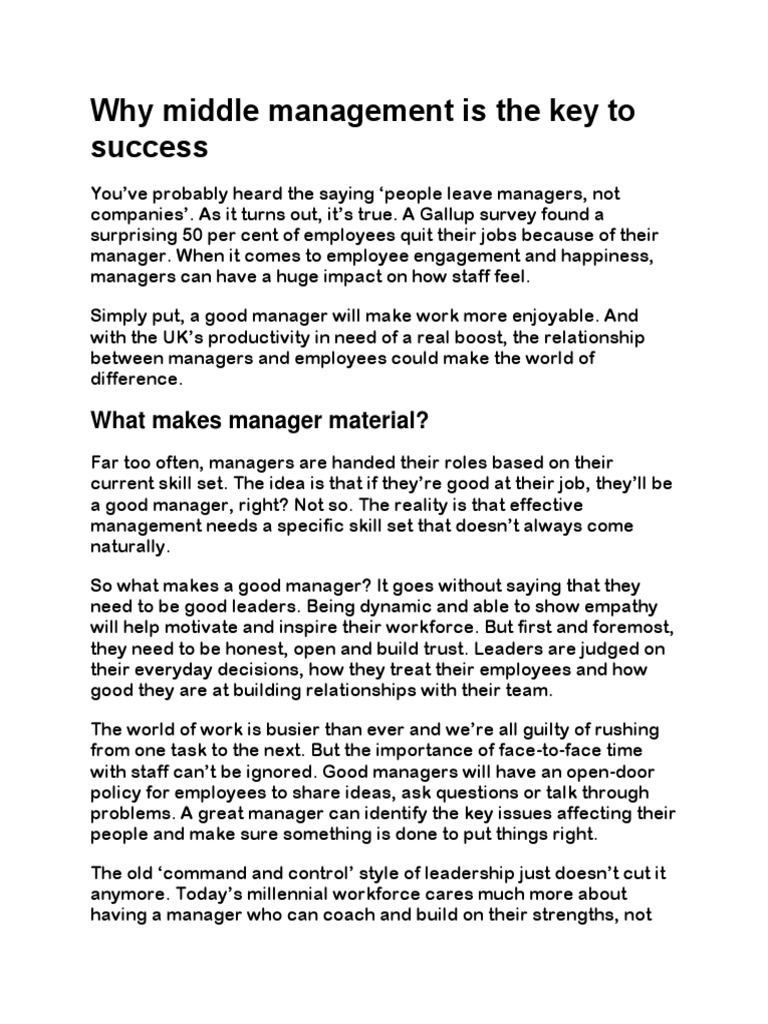The Crucial Role Of Middle Managers In Organizational Success

Table of Contents
Bridging the Gap: Middle Managers as Communicators and Translators
Middle managers are the critical link between upper management and frontline employees. They translate the strategic vision and goals set by senior leadership into actionable tasks and objectives for their teams. Effective communication is paramount for success in this role.
Effective Communication Strategies for Middle Managers:
-
Translating Strategic Goals: Middle managers must effectively interpret complex strategic plans and break them down into clear, concise, and understandable directives for their team members. This involves explaining why certain tasks are important, connecting individual contributions to the overall organizational objectives.
-
Open Communication Channels: Fostering a culture of open and transparent communication is essential. This includes actively encouraging feedback, both upward and downward, creating a safe space for employees to share concerns and ideas.
-
Effective Communication Tools: Utilizing a variety of communication methods is key. This can include regular team meetings, one-on-one check-ins, project management software, email updates, and even informal communication channels to ensure everyone is informed and engaged. Poor communication leads to decreased morale, misunderstandings, and ultimately, reduced productivity.
-
Impact of Poor Communication: Lack of clarity, inconsistent messaging, or a lack of feedback can lead to confusion, frustration, and decreased motivation within teams. This directly impacts productivity and can even lead to higher employee turnover.
-
Bullet Points:
- Regular feedback loops between upper and lower management.
- Clear articulation of company vision and goals, using accessible language.
- Addressing employee concerns and questions promptly and effectively.
- Utilizing diverse communication methods (email, meetings, instant messaging) to suit different audiences and communication styles.
Mentorship and Development: Cultivating Talent within Teams
Middle managers play a vital role in developing and retaining talent within their teams. They act as mentors, guides, and coaches, fostering a culture of continuous learning and improvement.
The Importance of Employee Training and Development:
-
Mentorship and Guidance: Middle managers should identify individual strengths and weaknesses, providing personalized coaching and guidance to help employees reach their full potential. This includes providing regular feedback, offering opportunities for skill development, and fostering a supportive environment.
-
Training and Development Opportunities: Investing in employee training and development is crucial for both individual and organizational growth. Middle managers should actively seek out and provide opportunities for professional development, whether through workshops, online courses, or on-the-job training.
-
Impact on Retention and Satisfaction: Employees who feel valued, supported, and challenged are more likely to be engaged and committed to their work. Effective mentorship contributes significantly to higher employee retention and job satisfaction.
-
Bullet Points:
- Identifying employee strengths and weaknesses through regular performance evaluations and observation.
- Providing personalized coaching and guidance, tailored to individual needs and career aspirations.
- Creating a culture of continuous learning and improvement, encouraging employees to seek out new challenges and opportunities.
- Effectively delegating tasks to develop employee skills and build confidence.
Driving Performance and Productivity: Goal Setting and Accountability
Effective middle managers are masters of goal setting and accountability. They establish clear expectations, track progress, and provide regular feedback to drive high performance within their teams.
Strategies for Improving Team Performance:
-
SMART Goals: Setting SMART goals (Specific, Measurable, Achievable, Relevant, Time-bound) is crucial for ensuring everyone is working towards the same objectives with a clear understanding of success.
-
Performance Management Tools: Utilizing performance management tools and techniques, such as regular progress reviews, allows middle managers to track team performance against established goals and identify areas for improvement.
-
Regular Feedback: Providing consistent and constructive feedback is essential for helping employees understand their strengths and weaknesses and improve their performance.
-
Addressing Underperformance: Proactively addressing underperformance through coaching, mentoring, and performance improvement plans is vital for improving team productivity and preventing larger issues.
-
Bullet Points:
- Setting SMART goals collaboratively with team members.
- Monitoring progress regularly and providing constructive feedback.
- Identifying and addressing performance issues proactively and supportively.
- Celebrating successes and recognizing achievements to maintain high morale.
Problem Solving and Conflict Resolution: Navigating Challenges Effectively
Middle managers are often the first line of defense when it comes to resolving workplace conflicts. Their ability to effectively navigate challenges and find solutions is essential for maintaining a positive and productive work environment.
Addressing Workplace Conflicts and Challenges:
-
Conflict Resolution Strategies: Middle managers should be trained in effective conflict resolution techniques, including active listening, mediation, and negotiation. They must be able to understand different perspectives and guide team members toward finding mutually acceptable solutions.
-
Proactive Conflict Prevention: Creating a positive and collaborative work environment can significantly reduce the likelihood of conflicts arising. This includes establishing clear expectations, promoting open communication, and fostering a culture of respect and understanding.
-
Bullet Points:
- Active listening and understanding different perspectives before intervening.
- Facilitation of constructive dialogue and negotiation between conflicting parties.
- Implementation of fair and consistent conflict resolution policies.
- Promoting a positive and collaborative work environment where employees feel comfortable raising concerns.
Conclusion
In conclusion, middle managers play a multifaceted and undeniably crucial role in achieving organizational success. Their abilities as communicators, mentors, performance drivers, and conflict resolvers directly impact team morale, productivity, and overall organizational effectiveness. Investing in leadership training for your middle managers is an investment in the future of your organization. Recognize the crucial role of middle managers in your company's success and provide them with the support, training, and resources they need to thrive. By empowering your middle managers, you unlock the full potential of your workforce and pave the way for lasting organizational success. Invest in your middle managers; invest in your future.

Featured Posts
-
 Grand National 2025 Key Runners And Aintree Predictions
Apr 27, 2025
Grand National 2025 Key Runners And Aintree Predictions
Apr 27, 2025 -
 Dubai Wta 1000 Caida De Paolini Y Pegula
Apr 27, 2025
Dubai Wta 1000 Caida De Paolini Y Pegula
Apr 27, 2025 -
 Ackmans Trade War Prediction Us Vs China
Apr 27, 2025
Ackmans Trade War Prediction Us Vs China
Apr 27, 2025 -
 Pegulas Dramatic Charleston Open Win Against Collins
Apr 27, 2025
Pegulas Dramatic Charleston Open Win Against Collins
Apr 27, 2025 -
 Canada Vs Us Why Tourists Are Choosing The Great White North
Apr 27, 2025
Canada Vs Us Why Tourists Are Choosing The Great White North
Apr 27, 2025
